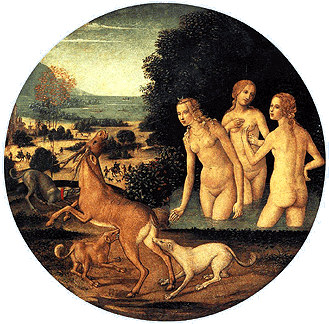
Balducci. Diana and Acteon.
Greville's Caelica 2: The Mistress as Virgin/Whore.
An Explication by Anniina Jokinen
FAIRE dog, which so my heart dost teare asunder,
That my liue's-blood my bowels ouerfloweth :
Alas, what wicked rage conceal'st thou vnder
These sweet enticing ioyes thy forehead showeth :
Me, whom the light-wing'd god of long hath chased, 5
Thou hast attain'd : thou gau'st that fatall wound
Which my soule's peacefull innocence hath rased,
And Reason to her seruant Humour bound.
Kill therefore in the end, and end my anguish,
Give me my death; me thinks euen Time vpbraideth 10
A fulness of the woes, wherein I languish:
Or if thou wilt I liue, then Pittie pleadeth
Help out of thee, since Nature hath reuealed,
That with thy tongue thy bytings may be healed.
|
Though at first glance this poem may seem to be just another sonnet in the tradition of the whiny Petrarchan lover, pleading his cruel mistress for mercy, it certainly throws a new twist on the tradition.
It is important to notice that Greville in this sonnet is playing with the story of Diana and Actæon from Greek mythology. Diana, the chaste virgin goddess of the hunt, was bathing with her nymphs when the mortal man Actæon accidentally happened upon her and saw her naked. Diana, enraged, turned him into a stag, and Actæon got torn to pieces by his own hunting dogs.
Greville begins the sonnet by addressing the lady as "Fair dog"; the reader, expecting a traditional sonnet in which the love object is idolized, may at first see "Fair god," before realizing the inverse is actually the case. This is a clever play on words, which immediately establishes the connection of the mistress to a goddess, though essentially he is calling her a female dog, a bitch—hardly classic fare for a sonnet. The bestial imagery is carried further in the same line with "my heart," punning on the heart/hart homophone. The cruelty of the mistress is thus made clear—she is at once a dog tearing apart a deer and a goddess tearing apart the heart of the dear.
In the next line (2), blood overflowing the bowels continues the imagery of physical violence, while at the same time suggesting the lover's arousal—blood is overflowing his bowels, his 'nether regions,' so to speak. The poet choosing to call it "life's blood" emphasizes the situation as one of life and death, and brings in the first insinuation of the other type of death, that is the Renaissance use of "death" as a euphemism for orgasm.
In "wicked rage" (3) can be seen Diana's rage at being seen naked by Actæon; yet the poet suggests that her rage is but a show to disguise the "sweet enticing joys" she is actually experiencing. Furthermore, the choice to use the word "rage" further points to raging passion. In lines 5-6 he says the "light-wing'd god", i.e. Cupid (symbol of lustful, earthly love, cupiditas), has long chased him, but she (Diana, the chaste virgin) has caught him. Her seeming modesty has given him a "fatal wound," (6) that is, made him fall in love—it has wounded him more surely than Cupid's arrow. This love for her in turn has destroyed his "soul's peaceful innocence" (7), that is caritas, the soul's holy love for God (or in this case Goddess), and has turned his Reason into its "servant-humor" (8), i.e. passion—back to lustful cupiditas.
Her cloying modesty, the poet claims, is toying with him, he is in "anguish" (9) and she is torturing him too long; even Time joins in to scold her (10) for keeping him so long in his "fulness" (11). He begs for her to have pity on him and "kill therefore in the end" (9) and "give me my death" (10) — again the Renaissance usage of death for orgasm. The specific way in which he asks to be relieved is "with thy tongue" (14).
A revelation happens in the final couplet: "Nature hath revealed that with thy tongue thy bitings may be healed." Nature has already revealed this—he knows from previous encounters that her tongue can "heal" the "fulness" in which he does "languish"! The volta (sudden change) in the final couplet thus unlocks the whole sonnet; she, who seems the virgin to the world, in private with him is the whore. Thus, what might have seemed like a derogatory beginning to the sonnet, is actually a private passion note, an inside joke, if you will, between the lover and his mistress—he is, in fact, calling her a bitch affectionately. And thus, she does turn into one traditional masculine ideal, and a goddess—the woman who is a virgin in public, but a whore in his bed. Crudely put, the message of the poem, from the lover to his mistress, is "come on, you horny wench, you goddess of the bedroom, let's do it again, I'm dying here!"
Article citation:
Jokinen, Anniina. "Greville's Caelica 2: The Mistress as Virgin/Whore."
Luminarium. 11 Feb 2007. [Date you accessed this page].
<http://www.luminarium.org/renlit/caelica2explication.htm>
 | to the Works of Fulke Greville, Lord Brooke |
Site copyright ©1996-2007 Anniina Jokinen. All Rights Reserved.
Created by Anniina Jokinen on February 5, 2007. Last updated February 11, 2007.
|


